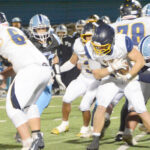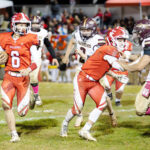Mountaineers can’t overlook Ohio
MORGANTOWN — West Virginia’s football team gets to see life on the other side of tracks on Saturday when it travels to Athens, Ohio, to face the Mid-American Conference champion Ohio University Bobcats on their home field, ancient Peden Stadium.
While the Big 12 offers up big-time football venues with all annuities that come with Power 4 programs in an arms race over facilities, this is a 24,000-seat stadium that was built in 1929, just before the Great Depression, for a cost of $185,000, which translated to $3.39 million in 2024 dollars.
The Mountaineers housed themselves in an 11,125 square foot locker room that was part of 2020’s $55 million-dollar stadium facility upgrade at Milan Puskar Stadium.
The Mountaineer home locker room has far more amenities than any of the players’ homes, with ice baths, barber chair, Dream chairs and so much more, but they will be quartered for the game in one of the smallest visiting locker rooms in all of college football.
Some say it’s so small you have to go outside if you want to change quarterbacks.
“I hope this makes our guys appreciate what they have,” Rodriguez said when asked about it. “I don’t want to say their spoiled, but sometimes when you go on the road and into a different environment you say ‘Golly, we got it pretty nice.'”
But let’s say locker rooms aren’t the top thing on Rodriguez’s mind these days.
“I haven’t even been in our visitor’s locker room,” he admitted, but he isn’t about to start asking for improvements in it. “I don’t think that’s the best, though, and why would it be? Why do we want to make a visiting locker room good? There’s going to be some interesting challenges there, but we have to be mature enough to handle it.”
n n n
Games may be won or lost on Saturday but the outcome may be set up during the week and Rich Rodriguez is well aware of that.
That’s why he almost lost it when it was suggested during the media session on Tuesday that the trip Ohio U. this weekend might actually be a “trap game,” where his players could be caught facing a non-Power 4 opponent while looking past them toward the Backyard Brawl meeting with Pitt the next week.
“If they’re thinking about anybody other than Ohio, they need to go somewhere else. It’s as simple as that,” Rodriguez responded, neither angrily nor cordially. “I don’t even want them thinking about Saturday. I want them thinking, ‘How am I going to get through today’s practice?'”
n n n
Receiver Cam Vaughn, who came over from Jacksonville State in Alabama where he played for Rodriguez and showed himself to be a potential star with a huge outing in their bowl loss to Memphis after Rodriguez had left to coach at WVU, added to his star potential in his Mountaineer debut.
Vaughn had seven catches for 126 yards, including a 46-yard touchdown.
But there was one very large black mark on his resume, fumbling the ball away in a game where the Mountaineers somehow lost three fumbles in four snaps, something Rodriguez said had never happened in his career.
“He’s an explosive player, but he’s got to take care of the ball better than he was,” Rodriguez said. “It was a fumble waiting to happen before then because of how he was carrying the ball. So we got to learn from that.”
Vaughn said that he had never fumbled before.
“I know it’s a big part of Rich Rod’s chemistry or whatever,” Vaughn said after the game. “That’s our program and that can’t happen.”
n n n
A week or so ago former WVU assistant coach Bill Kirelawich was announced as a member of the 2025 class of the school’s athletic Hall of Fame.
Ever wonder how he got the job as a member of Don Nehlen’s staff when the Hall of Fame head coach was named to succeed Frank Cignetti in 1980 as the two had no history together?
“When I took this job, he was a graduate assistant. The guy I’d hired to coach the defensive line was Bobby Sutton,” Nehlen recalled this weekend.
Sutton had been defensive coordinator and defensive line coach at Western Michigan and Illinois the five previous years and looked like a solid hire for Nehlen and wound up becoming head coach at Army, putting together a 10-2 record in 1996.
But you won’t find his WVU stop on his resume.
“He took the job, but his wife came to town and said, ‘I’m not living in Morgantown,’ and he quit. He wasn’t here over two weeks,” Nehlen said.
Kirelawich had been a graduate assistant on Cignetti’s staff and was looking for work.
Nehlen gave him the job and he wound up spending 32 years in Morgantown until 2011.
“Best move I ever made,” Nehlen said.
n n n
We’ve talked incessantly about how revenue sharing and the transfer portal have changed the game of college football but right behind those two recent monumental changes to the game is one that emerged slowly through the improvement in technology.
Consider scouting.
A tidbit appeared late in the 1956 season in an AP story, stating that the Big Ten and the Pacific Coast Conference had reached an agreement that for the Rose Bowl that year they would exchange TWO films, picked by the opponent, and no other scouting would be allowed.
Nowadays, you just go online and you can get complete game tapes of any opponent you want, which obviously allows you to study any game or play you want.
Of course, considering the recent sign-stealing problems in college sports, why do you think even back in the day those Rose Bowl teams weren’t really limiting themselves to watching just two games of films, even if there was no Internet?


